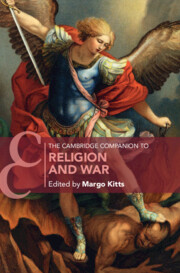Book contents
- The Cambridge Companion to Religion and War
- Cambridge Companions to Religion
- The Cambridge Companion to Religion and War
- Copyright page
- Contents
- Contributors
- Preface
- Introduction
- Part I Classical Foundations
- Part II Just War
- 9 Judaism and the Ethics of War
- 10 The Idea of Just War in Christian Thought from the Age of Augustine through the Early Modern Period
- 11 Islam and the Just War Tradition
- 12 Is There a Hindu Just War?
- 13 Buddhist Just War Traditions
- Part III Religious Nationalism
- Part IV Featured Conflicts
- Index
- Cambridge Companions to Religion (continued from page ii)
- References
13 - Buddhist Just War Traditions
from Part II - Just War
Published online by Cambridge University Press: 04 May 2023
- The Cambridge Companion to Religion and War
- Cambridge Companions to Religion
- The Cambridge Companion to Religion and War
- Copyright page
- Contents
- Contributors
- Preface
- Introduction
- Part I Classical Foundations
- Part II Just War
- 9 Judaism and the Ethics of War
- 10 The Idea of Just War in Christian Thought from the Age of Augustine through the Early Modern Period
- 11 Islam and the Just War Tradition
- 12 Is There a Hindu Just War?
- 13 Buddhist Just War Traditions
- Part III Religious Nationalism
- Part IV Featured Conflicts
- Index
- Cambridge Companions to Religion (continued from page ii)
- References
Summary
This chapter considers foundational Buddhist thought and the relevance (or not) of modern just war theory. A just way to think about war, conduct war, and repair harm from war from a Buddhist perspective would be to stop the endless cycle, to avoid war altogether by accepting responsibility, and addressing the catalytic harms that perpetuate it.
- Type
- Chapter
- Information
- The Cambridge Companion to Religion and War , pp. 283 - 296Publisher: Cambridge University PressPrint publication year: 2023



